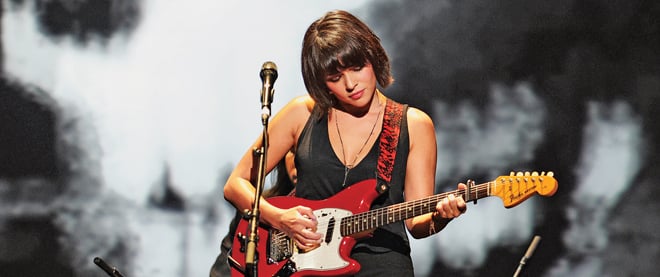Norah Jones vamps it up
Forget easy listening, the songwriter’s embraced some darker, Lynchian arrangements
Share

Norah Jones was the darling of the 2003 Grammys, the Adele of her time, and yet the coffee-house songstress with the bestselling CD of the last decade is still on a mission to reinvent herself. First came her pop-jazz debut, Come Away With Me, which won eight Grammys, then the bluegrassy Feels Like Home album in 2004, followed by 2007’s cabaret-ish Not Too Late. In 2009, there were indie rock guitar riffs in The Fall. Unfortunately, many reviews since Come Away With Me have been lukewarm, and every release has yet to approach her debut disc’s diamond-selling status. Now Little Broken Hearts, produced by Danger Mouse (whose real name is Brian Burton), is far from radio-friendly fare and features the gloomiest arrangements and lyrical content she’s ever recorded.
“I feel like I need to shake up people’s perception of me again,” Jones says. “To be honest, it’s a little daunting to try to leave all the critics outside and experiment with something entirely new. You try not to be too overwhelmed but you have to look at the bigger picture and pray people will stick with you.”
Jones has been under a lot of pressure to stay relevant, to stay cool, says Jesse Harris, her long-time collaborator and writer of her Billboard No.1, Don’t Know Why. “She was doing sold-out arenas and detractors started coming out of the woodwork hard and fast during that period of her success. They called her stupid names like Snorah Jones because she played mellow music.”
Harris wanted her to make more music in the vein of Come Away With Me, but Jones had no interest in making easy-listening tunes. “She decided she wanted a hipper crowd to appreciate her and a new audience to embrace her. If that wasn’t the case, she wouldn’t have previewed her new songs at South by Southwest or hired Danger Mouse to make this album with her.”
Offering the same kind of spaghetti-western guitar sound permeating hipster acts such as Lana Del Rey, Danger Mouse’s sound path for Little Broken Hearts is more like what he achieved with director David Lynch on the 2010 disc Dark Night of the Soul. The track list on Little Broken Hearts includes a song called 4 Broken Hearts, which sounds as though it was lifted from the soundtrack to Lynch’s 1990 flick Wild at Heart. Another standout is a bizarre Twin Peaks-ish track called Miriam, where Jones croons about murdering her boyfriend’s mistress. In that song, as well as All a Dream, her singing mimics the ghostly delivery of Julee Cruise—a vocalist featured on the soundtracks to Blue Velvet, Twin Peaks and Twin Peaks: Fire Walk With Me. “I feel like David Lynch’s music and his films are very connected—they were definitely an inspiration for these songs,” Jones says. “Especially that Chris Isaak and Twin Peaks period. Those guitars and vocals made their way into this music because [Danger Mouse] still had that in him from working with [Lynch]. I was also listening to Neil Young albums like Zuma and On the Beach so more of that darker matter mixed into the pot.”
Jones also revisited her image—something she resisted doing for previous discs. “I’ve never want to portray some theatrical character or role. I’m just me, take it or leave it,” she says, though she made an exception for the cover of Little Broken Hearts, which depicts Jones as vampy Pulp Fiction villainess. “There was this poster of the ’60s film Mudhoney hanging in the studio, so I decided to go for it.”
According to Lucy O’Brien, the author of She Bop: The Definitive History of Women in Rock, Pop and Soul, Jones’s first notable costume change couldn’t have come at a better time. “Lady Gaga has altered the way female vocalists release music altogether. A new image, sadly, is a way of bookmarking a new change of direction in a pop singer’s career. In Norah’s case, playing the game could win over a younger audience.”
As for Jones, for the longest time she was horrified with the red carpet and dressing up. “Creating a character takes a lot of work. It’s also exciting and it’s kind of the thing to do, but I’d rather commit to what I think is interesting and not predictable in music.”